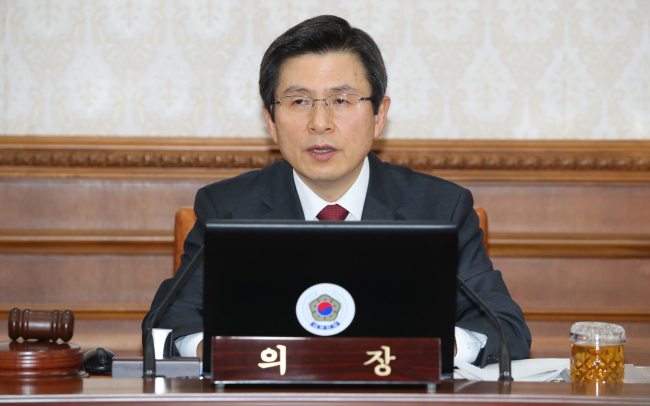Acting president says S. Korea
Acting President and Prime Minister Hwang Kyo-ahn said Tuesday the South Korea-Japan agreement clinched in 2015 on the settlement of the enslavement of Korean women by Japan during World War II should be respected.
Hwang also said people should refrain from making remarks or actions that can worsen the situation surrounding the sexual enslavement issue, apparently referring to Japan, as well as local opposition parties.
South Korea and Japan reached a deal in December 2015, where Tokyo agreed to provide 1 billion yen ($8.62 million) for the creation of a foundation aimed at supporting the sexual slavery victims, euphemistically called comfort women during its colonial rule of the Korean Peninsula.
The acting president said the agreement was aimed at recovering the honor of the victims, and that Japan acknowledged its responsibility. He also claimed that the pact aims to lay the base for a future-oriented relationship between Seoul and Tokyo.
The opposition parties, as well as some of the victims, however, claim the agreement was made too hastily and without receiving consent from the victims. Opponents claimed Japan has not expressed a clear stance or apology on its role in the sexual enslavement of women.
Tokyo, meanwhile, recalled its top envoys to South Korea and suspended bilateral currency swap negotiations in protest of a civic group's installation of a statue symbolizing the "comfort women" in front of its Consulate General office in the southern port city of Busan.
Political observers said Hwang's comment urging restraint also targets opposition parties that have been claiming that the Seoul-Tokyo deal must be scrapped.
On Monday, Rep. Woo Sang-ho, the floor leader of the Democratic Party, said the parliament should set up a separate budget to return the money it got from Japan, claiming the people are feeling "humiliated" by the deal.
The minor opposition People's Party said the agreement was not an official deal signed by the two governments, but only a document clinched between foreign ministers, and that it is not legally binding for future administrations.
